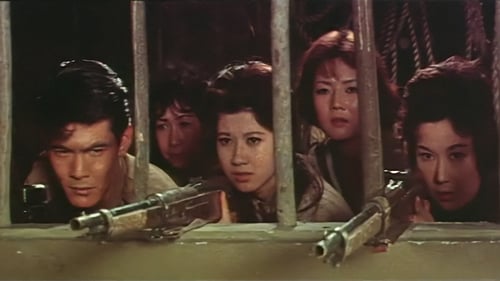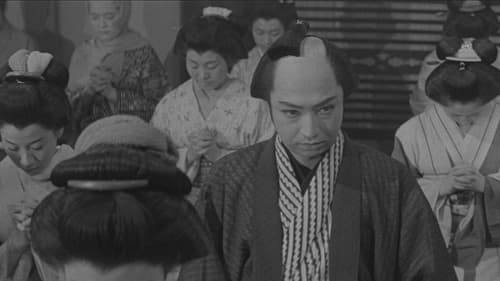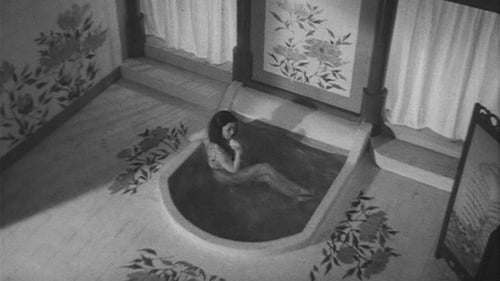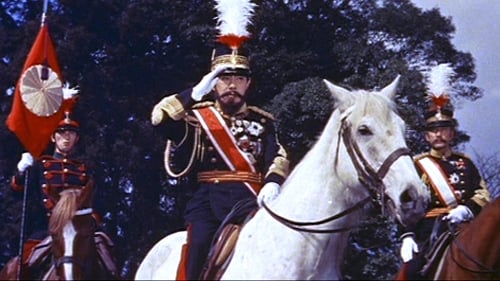
Japanese comedy film.

Third and last "Maboroshi tantei" film, based on the manga by Jiro Kuwata.

Japanese comedy film.

Yajima
Rumi (Yoko Mihara) and Emi (Masayo Banri) are sisters who dance nightly at the Blue Moon cabaret, which happens be the headquarters of a drug ring. Offstage, Rumi captivates the gang boss, Iwahara (Shuntaro Emi); while Emi attracts the portly club manager, Yajima (Saburo Sawai). Meanwhile their older brother Shinichi (Ryo Kuromaru), a seaman, is unwittingly assisting Iwahara with his drug running. When Shinichi’s ship is sea-jacked by another drug gang, an outraged Iwahara suspects him of treachery and has him beaten and confined in a dungeon-like basement. Rumi and Emi try to free him, but a gang hitman discovers them - and their attempt ends in failure. Now under suspicion themselves, the girls try to escape, but luck goes against them and they are taken to an island where Iwahara and his crew plan to ambush the rival gang.


Two lovers lost in the mountains. In what direction do not go, they find themselves in a mysterious forest pond, as if some kind of force does not want to let them go. Once upon a time, over a century ago, there had been a crime, whose shadow still hovers over these places.

After the massacre of Christians at Shimabara, followers of Amakusa Shiro band together in a plot to overthrow the shogunate in order to exact revenge on the Tokugawa. At the same time there is a succession dispute in the Kuroda clan, as one faction tried to usurp the rightful heir and take over the honored clan. Before his untimely death, the lord of the Kuroda bestowed “Nihongo”, a magnificent spear, on his finest warrior, which ultimately brings him into contact with two of Japan’s most famous historical figures, Yagyu Jubei and Miyamoto Musashi. Can the three masters of martial art join forces to defeat their enemies and save the nation?

The year is 1945, months prior to Japan's ultimate defeat in WW2, and military lieutenant Sugawa is sent on a critical mission to deliver micro-fiche war plans to Tokyo from his base in Malaysia. But while flying over Chinese waters his plane is shot down and he is taken aboard a ship bound for Shanghai to deliver its merchandise - a ship filled with Female Slaves kidnapped from Japan. Will he abandon the women to pursue his main objective? Or will he fight foes, spies and pirates to save these women against all odds?

Sashichi investigates the mysterious murders of four beauties, all of whom were stabbed in the chest.

Japanese crime film.

Kuroki
Japanese crime film.

The film marked Yōko Mihara's debut as the star of Shintoho's series of ama films, a role she took over from Michiko Maeda.

Kichizô Gotô
In 1870's Tokyo, Den steals to support the daughter of her first marriage and her consumptive second husband. She falls in love with a young policeman, but is coerced into becoming the mistress of and procurer for a vice boss.

1958 jidaigeki directed by Masaki Mori for Shintoho.

Kinbei Watanabe
Harada Kai, the Date clan's Chamberlain attempts to take power from the lord himself.

A samurai rescues a mischievous tanuki from hunters and sets it free. When the samurai's wastrel son hatches a plot to kill his father for his fortune, the magical tanuki is determined to protect its rescuer.

Fictionalized retelling of the life of a Geisha poisoner.

Fleet staff officer
Meiji Tenno portrayed the ramp up to the Russo-Japan War. In addition to showing the political events that led to war, it also showed the era from the story of a farm family in rural Japan who sent their son off to war. As such, it could be considered an anti-war movie, showing how, while war is devised by governments, the people do not really understand what war is, and it's combatants often do not know what they are fighting for.

Kumezo
Famed detective Dandy Sashichi tries to solve who's behind the serial murders of six beautiful women under the aegis of local showman Ibaragiya. The film opens with the sextet humiliating a respected painter's portraits of them, driving the man to a suspicious suicide. Later, while celebrating his son's impending marriage into a wealthy family, Ibaragiya releases six pigeons from a pleasure boat, each with a rolled up drawing of one of the beauties tied to their legs. He offers a cash reward to whomever recovers the pictures, but they instead become death notices of which of the six are next to die.

Yuzo
20th film adaptation of the novel Ono ga tsumi (published 1900-1901).

Admiral Isoroku Yamamoto leads the Combined Fleet of the Imperial Japanese Navy to defeat the American Fleet.

Ryôhei Ishizuka
Kizaki, an upstart at a trading company has one more assignment for the day before meeting his lovely girlfriend, Natsuki for a date. Little does he know that he's walking straight into a trap set up by his boss, Asanuma and his murderous right hand man. The next day Kizaki finds himself framed for the murder of the company president, and the robbing of the company safe. Natsuki innocently waves goodbye to her loved ones as the boat sails only find herself caught in Asanuma's evil scheming and the object of his lust. In a desperate attempt to escape, she falls to the watery depths. When we next see her she has washed ashore like a siren in the nude on a deserted island inhabited by five castaways who fight each other for her. She learns there's a rich wealth of clams underwater and eventually comes into a large fortune in pearls. Once rescued, she returns to Japan with revenge on her mind.

頃は天保、所は江戸。折からドッと起る喧嘩のドヨメキの中で、悪浪人数名を向うに廻して群衆の人気を集めている若衆は、小笠原家の一人娘、男嫌いのじゃじゃ馬姫桔梗だった。小笠原家では恐妻家の父君、お狐様を狂信の母君、家老の久松彦右衛門が、松平家の若君麟太郎と桔梗の縁談をまとめようと協議中。

In A Tale of Archery, young, timid bowmaster Kazuma (Akitake Kôno) seeks to beat the archery record set by Hoshino Kanzaemon, a mysterious figure who, it is rumored, drove the previous champion (Kazuma’s father) to suicide. Possessed of much raw talent, Kazuma is also very much a coward, holing himself up in an inn run by the kindly Okinu (Kinuyo Tanaka) and generally avoiding confrontation of any sort. Despite his clandestine manner, enough of the locals know of Kazuma’s purpose and an attempt is made on his life. He is saved by Karatsu Kanbei (Kazuo Hasegawa), a samurai who offers to help Kazuma hone his archery skills, though it soon becomes clear that this apparently selfless stranger has several potentially shady ulterior motives.

Murata Gengo
During the Warring States era, Hozoin Kakuzenbo and Yagyu Tajima-no-kami, being best friends, spend their days acquiring skills of the spear, sword and martial arts. Hozoin loses a series of matches with master swordsman Kozumi Ise-no-kami. Bitterly ashamed, Hozoin embarks on a journey, trying to perfect his skills. A few years later, Hozoin is ready and it's time for the ultimate showdown with Ise-no-kami!

A 1942 film.

Tozo

Sannojô Kobata
This epic depicts the battle between Uesugi Kenshin and Takeda Shingen. The focus of the story is the struggle by the unit leader in charge of the main supply wagons and the supply troops to transport materiel to the Uesugi army. To this are added episodes involving an itinerant woman.

Jurobei, a kaisen tonya (wholesaler in port) in Awa, was wronged and killed on the day of the Dance Festival by the evil merchant & the chamberlin. His brother (Kazuo Hasegawa) vowed vengeance on the day of his brother's death. So every year the villains are worried during the Awa Dance Festival (which is part of the Obon festival), but nothing has ever happened, until seven years later...

The story is based on the serial novel by Tsunoda Kikuo.

The story is based on the serial novel by Tsunoda Kikuo.

Feature film.

My Daughter's Only Wish tells the story of a poorly paid and clumsy office clerk, played with much comedic talent by Atsushi Watanabe. His biggest problem: His daughter Hideko is too clever and is expected by her teachers to enter the school for higher girls after graduating from primary school. But how is our poor clerk supposed to pay the school fees? How does poor Hideko feel about the situation? How can they cope with the envious colleagues who have less brighter daughters? And - an important question for Hideko's mother - what will the neighbours think? What's the point about getting a good education for girls anyway?

Japanese film.

dir: Teinosuke Kinugasa

Kanjûrô Kurokawa
Two cowardly palanquin carriers know the culprit of a murder but are too scared to report it to the police. In the mean time, an innocent man is arrested as the murderer and chaos ensues. Pre-war jidaigeki film.

Ronin Tachibana
An onnagata (female impersonator) of a Kabuki troupe avenges his parents' deaths. Remade in 1963 as Yukinojô Henge.

A mournful masterpiece by Kinugasa Teinosuke


Hachirō
This 1932 adaptation is the earliest sound version of the ever-popular and much-filmed Chushingura story of the loyal 47 retainers who avenged their feudal lord after he was obliged to commit hara-kiri due to the machinations of a villainous courtier. As the first sound version of the classic narrative, the film was something of an event, and employed a stellar cast, who give a roster of memorable performances. Director Teinosuke Kinugasa was primarily a specialist in jidai-geki (period films), such as the internationally celebrated Gate of Hell (Jigokumon, 1953), and although he is now most famous as the maker of the avant-garde silent films A Page of Madness (Kurutta ichipeji, 1926) and Crossroads (Jujiro, 1928), Chushingura is in fact more typical of his output than those experimental works. The film ranked third in that year’s Kinema Junpo critics’ poll, and Joseph Anderson and Donald Richie noted that 'not only the sound but the quick cutting was admired by many critics.





















